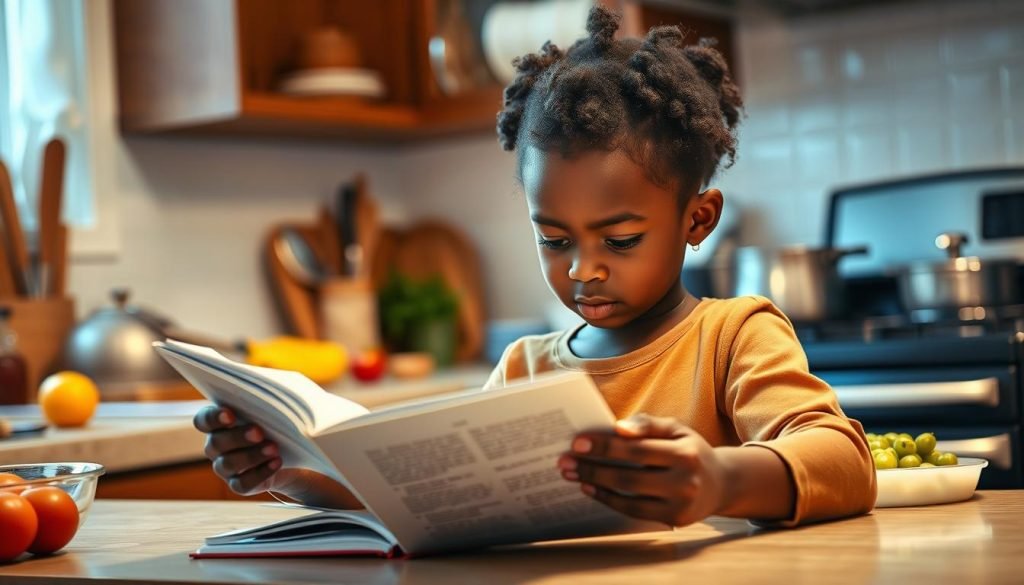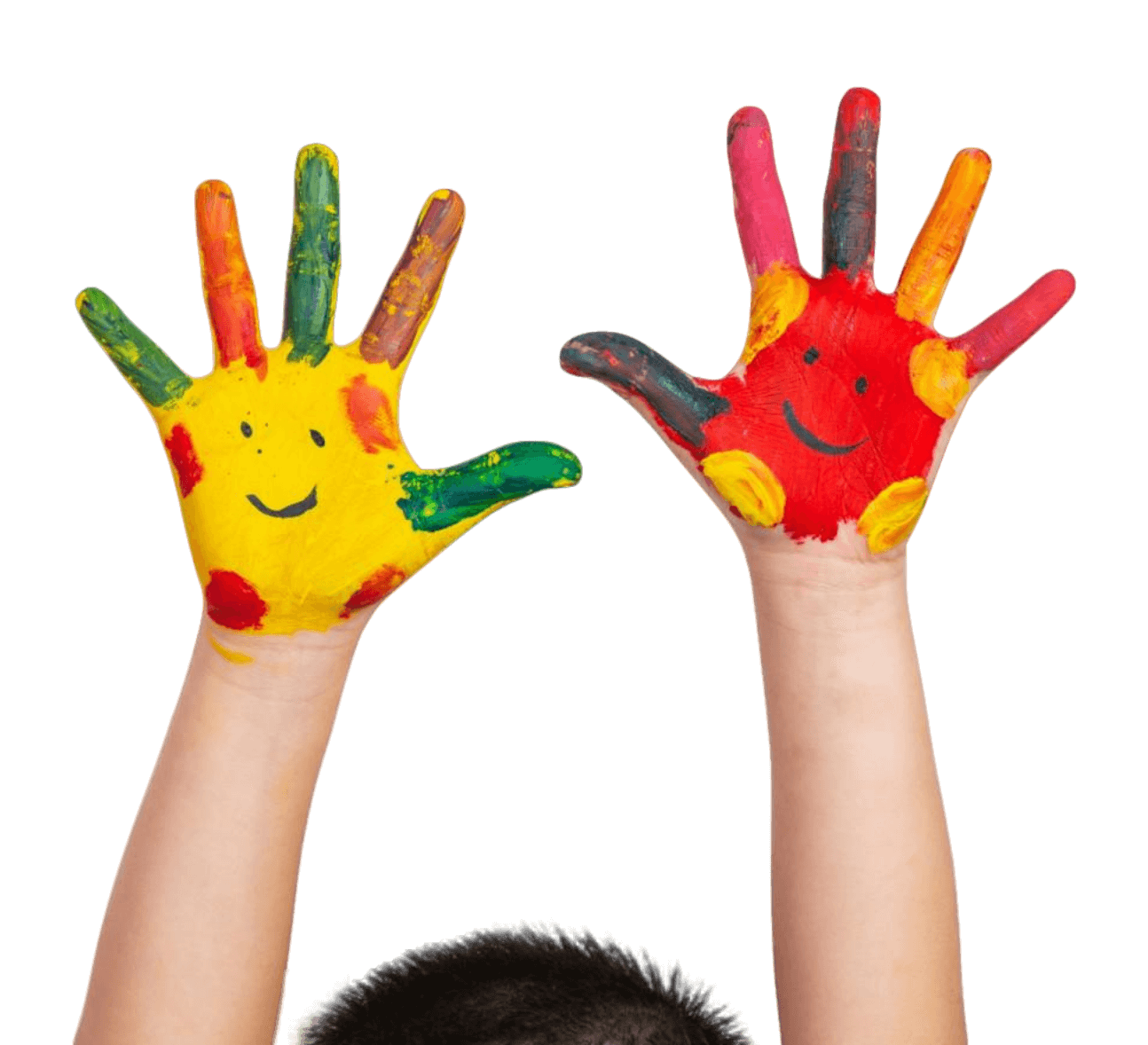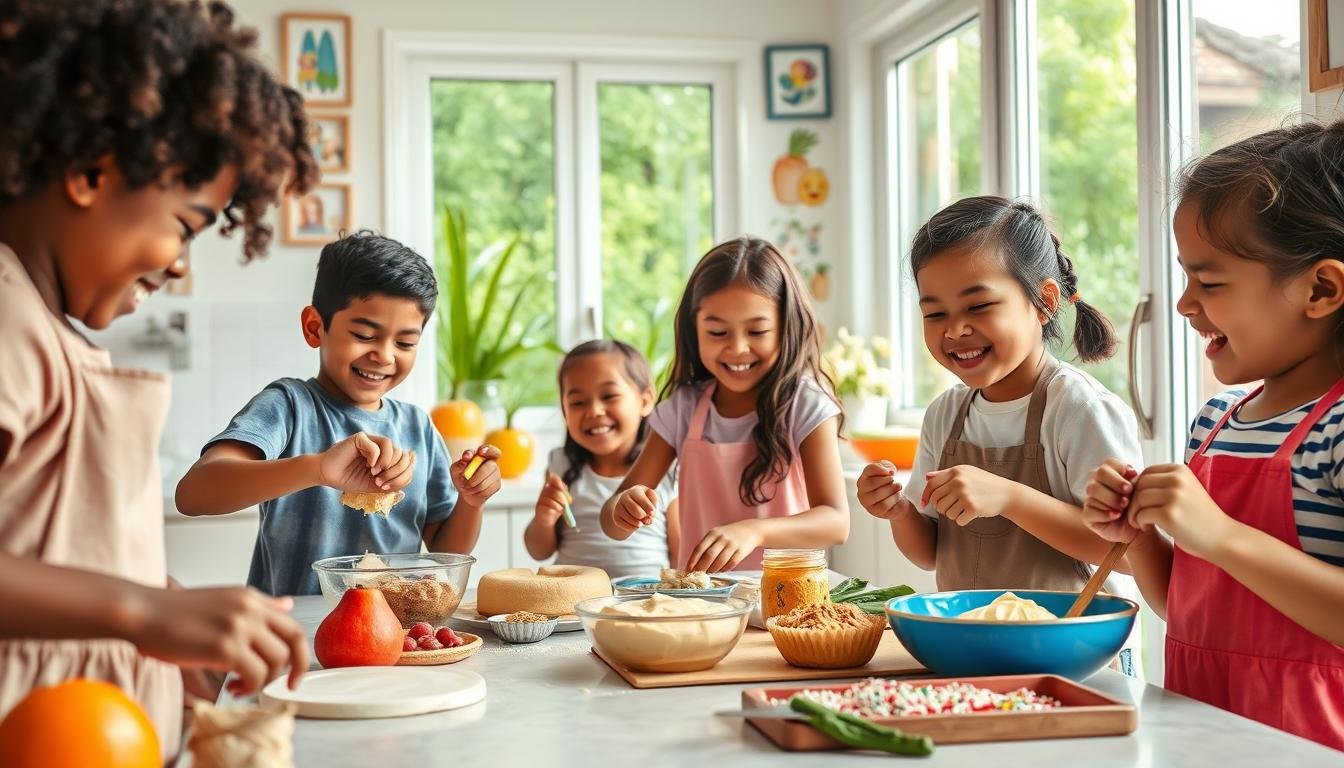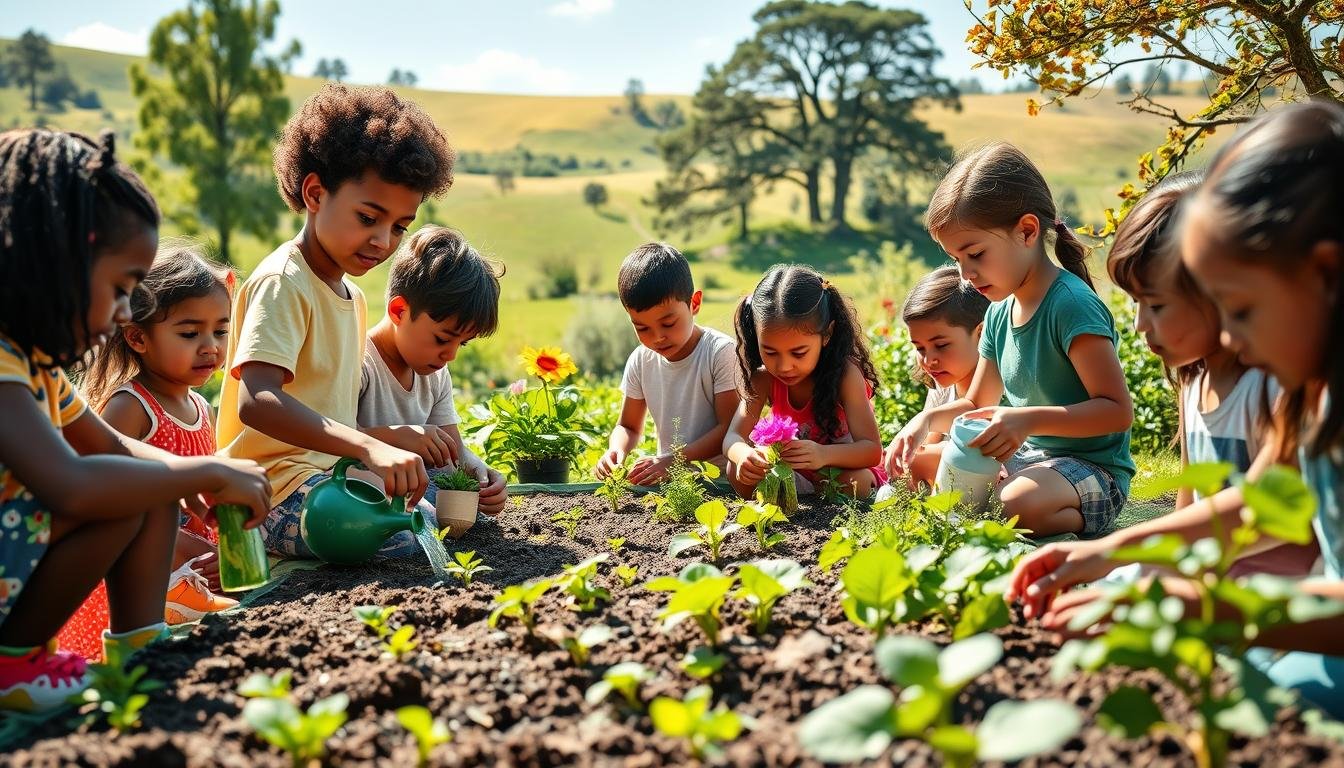“Give a man a fish, and you feed him for a day. Teach a man to fish, and you feed him for a lifetime.” This wisdom is at the heart of why we involve kids in cooking. It’s not just about making tasty dishes. For families like ours, especially those with kids who have special needs, the kitchen is more than a place to eat. It’s where learning and growth happen.
The kitchen is more than a spot to cook food. Imagine it as a classroom where cooking with kids teaches them valuable lessons. Across the U.S., where fast food is popular, involving kids in culinary education, especially children with special needs, is changing things.
So, why should we cook with our kids? There are many reasons. For starters, it teaches them crucial life skills. Imagine a young child, maybe just five, making batter for pancakes. Their face shows both happiness and focus. This moment teaches more than just cooking. It’s a lesson in science, math, and reading. Plus, it helps them learn patience and how to work with others.
Cooking with kids isn’t just a teaching moment; it’s fun and helps them grow. It boosts their brain and hands’ skills through tasks like measuring. Kids learn best when they can touch, smell, and see what they’re doing. Cooking makes learning stick because it’s hands-on and fun.
We urge every parent and caregiver to think of the kitchen as more than a place to make meals. It’s a lively learning space. Following a recipe, measuring ingredients, and flipping pancakes builds a child’s independence. Every minute spent cooking is a step in their growth. This approach is what we stand for. It’s about giving kids skills they can use all their lives.
The Importance of Kitchen Safety Awareness
Talking about kitchen safety for kids is key, especially for children with special needs learning to cook. It goes beyond just staying away from sharp objects or hot areas. It’s about making a space where young cooks can learn and have fun safely.
Starting with teaching kitchen hygiene is simple—begin with hand washing. Kids should wash their hands with warm soap water for 20 seconds. Have them sing “Happy Birthday” twice to make it fun. This ensures they wash their hands well and enjoy doing it.
Avoiding preventing cross-contamination is also vital. Teach them to use different boards for raw and cooked foods. Explain why it’s important to use various utensils for these foods. We need to follow these key steps in our kitchen routines:
- Wash hands and surfaces often.
- Keep raw and cooked foods separate.
- Cook foods to the right temperature.
- Refrigerate promptly at below 40°F.
Using real-life situations can help reinforce these practices. Creating a “Kitchen Safety Crime Scene” for kids to spot kitchen errors is both fun and instructional. It teaches them the kitchen dos and don’ts in a memorable way. They’re more likely to remember these lessons each time they cook.
Statistics from the National Safety Council show that proper education and safety measures can prevent about 75% of all kitchen accidents. This shows how impactful basic kitchen safety lessons can be for our children’s health and safety.
Teaching kitchen safety is more than just avoiding danger. It’s about building a life-long respect for safe and healthy cooking. By starting early, we’re not only teaching them how to cook. We’re giving them the tools to cook safely and healthily. This leads to better food habits and a thoughtful approach to food, important for their growth and health.
Mastering the Art of Measurement and Math
Learning through cooking isn’t just about recipes. It’s about practical experiences that boost math skills in the kitchen. Picture a child learning the difference between tablespoons and teaspoons. Or understanding half and quarter cups. These aren’t tiny details. They’re vital cooking measurements for kids, building a strong math foundation.
Using real-life examples, like measuring ingredients, helps teach complex math. For instance, fractions and ratios become clearer. This approach deepens math understanding and makes it part of daily life.
But math learning isn’t just about numbers and measurements. When kids play with blocks, they explore balance, volume, and dimensions. These activities reflect real-life situations. They create a strong learning environment where kids can try things out and solve problems. This helps build early skills in spatial reasoning and critical thinking. These skills are crucial for a child’s learning and growth.
- Understanding volumes and quantities through cooking
- Developing cognitive skills while preparing meals
- Enhancing problem-solving capabilities through practical applications
Gaining math skills in the kitchen is more than food prep. It’s about developing skills for life. It prepares kids to face different challenges, whether in school or daily activities. Thus, learning through cooking turns day-to-day tasks into rich learning chances.
Nurturing Reading and Following Instructions
Getting kids to read recipes for children is more than just a cooking guide. It’s key for their cognitive development. As kids work through recipes, they aren’t just learning to combine things. They’re getting better at understanding complex directions and improving their reading skills. This is especially true for kids with special needs, where following cooking instructions closely can boost their overall learning.

Using cooking in everyday learning makes the kitchen a fun classroom. Kids break down recipes, connect steps, and follow them to make a meal. This process helps them get better at following instructions. And they improve this skill through practice and active involvement.
| Age | Skill Development | Instruction Following |
|---|---|---|
| 1-2 years | Basic gestures, understands ‘no’ | Single-step instructions |
| 2-3 years | Word and gesture association | Two-step related instructions |
| 3.5-4 years | Complex instruction processing | Three unrelated commands |
| 5+ years | Multi-tasking and independence | Multiple-step directions |
Knowing these milestones helps us create learning strategies for each developmental stage. This encourages kids to be self-reliant and confident. In our Pembroke Pines services, we see big changes in kids who do such structured activities regularly. Celebrating their progress helps them feel supported, which is important for their growth.
So, as caregivers, we do more than just oversee their recipe reading and cooking. We’re teaching them a vital life skill—how to understand, act, and complete tasks. This will help them for years. By getting them involved in reading recipes for children and understanding cooking instructions, we’re preparing them for life. They become eager to learn and grow on their own.
Life Skills You Can Teach a Kid
Life skills through cooking teach more than just recipes. They help kids grow independent in the kitchen. They also teach practical skills for children with special needs. Every cooking step, from slicing to mixing, helps kids learn important skills outside the kitchen too.
When we talk about children with special needs, the kitchen is more than a cooking spot. It’s where they learn and grow. They can work on their motor skills and problem-solving. This boosts their independence too.
Let’s look at how kitchen tasks help children learn important life skills:
| Task | Life Skill Developed | Statistical Benefit |
|---|---|---|
| Measuring Ingredients | Critical Thinking | 85% of employers value this skill |
| Following Recipes | Reading and Comprehension | 50% increase in positive social interactions |
| Setting Table | Responsibility | 50% more likely to maintain a clean environment |
| Chopping Vegetables | Fine Motor Skills | Improves coordination vital for daily tasks |
| Cleaning Up | Hygiene and Organization | Reduces childhood illnesses by up to 25% |
Kitchen tasks boost children’s practical skills, helping them handle daily life better. For more tips, check out practical skills for children with special needs.
We think every child should learn life skills for a confident future. Starting early, we can help our special needs kids grow up to be independent, skilled adults. Every kitchen activity helps towards this goal.
Cultivating Time Management and Planning
Introducing our children to the kitchen isn’t just about cooking. It’s also teaching them valuable time management skills. Through cooking, they see how to plan and manage their time. They learn to plan meals and understand task sequences, from quick stir-fries to slow simmers.
Cooking shows kids how to organize their day. They set aside time for prepping, cooking, and cleaning. This mirrors managing daily tasks efficiently. Planning meals helps them look ahead and prepare for what’s coming, which helps outside the kitchen too.
Learning to align cooking times teaches them about synchronization and timing. For instance, pasta should be ready when the sauce is, just like timing projects right. This improves their cooking and teaches them to be methodical elsewhere.
The “Time Management for Kids” program stresses early time management skills. Cooking is a practical way to learn these skills. It makes understanding time management easier for young minds.
The kitchen becomes a place to experiment with time. Kids learn to judge how long tasks take and adjust their speed. They become more independent and confident in managing their time. Cooking becomes more than a skill—it teaches them to prioritize and be effective in life.
As kids grow, they learn to spot what needs immediate attention and what can wait. This skill, sharpened by cooking, is key for good time management. It helps them plan better and avoid problems in their schedules.
Time in the kitchen helps grow strong, smart individuals. They learn to see time as a valuable asset to be used wisely.
Enhancing Fine Motor Skills and Coordination
Cooking is often seen as a daily chore or a way to feed ourselves. Yet, for kids, especially those with special needs, it’s much more. It’s a key way to boost important life skills. Today, we dive into how kitchen activities help improve fine motor skills and bilateral coordination. Let’s see why these cooking tasks are more than just about food.
Activities like pouring, mixing, kneading, and cutting are great for kids to work on their control and coordination. These tasks make kids use their hands in a steady way. This strengthens their muscles and makes them more precise. For kids facing challenges like autism, doing these activities over and over helps them get better at using their eyes and hands together. It also helps them plan their movements, which is key for school and daily life.
Cooking also offers rich sensory experiences that are very helpful. Touching different food textures can be healing. It helps kids who seek out sensory experiences and those who usually shy away from them. Here’s how planned kitchen activities can help in sensory experiences in cooking and boost motor skills:
| Activity | Motors Skills Enhanced | Sensory Benefits |
|---|---|---|
| Measuring Ingredients | Improves hand-eye coordination | Visual and tactile exploration |
| Stirring Mixtures | Enhances wrist and arm strength | Encourages olfactory and tactile senses |
| Kneading Dough | Bolsters hand strength and coordination | Engages tactile and proprioceptive systems |
| Cutting Soft Foods | Develops precision and hand stability | Introduces texture and resistance understanding |
Getting kids involved in cooking prepares them for being independent in the future. It also helps improve their fine motor skills, vital for their growth. From making a simple salad to baking cookies, each step is helpful. Occupational therapists highlight the value of these engaging, therapeutic activities. They meet each child’s unique development needs.
With every whisk and roll, kids are not just cooking. They are learning skills that help them grow in the kitchen and beyond. By understanding the wide-ranging benefits of cooking, we give our kids the tools for a confident and independent future.
Conclusion
The early years are crucial for building a bright, self-reliant future. In the kitchen, kids learn more than just making meals. It’s a place where children, especially those with special needs, gain important life skills. This helps them grow independent, ready for adult life. Kids Miracle Steps aims for these goals, teaching kids to plan and take care of themselves, starting a journey towards empowerment.
About 37% of young people today don’t know enough about managing money. This shows we need to teach practical skills like cooking early on. Kids Miracle Steps is here to help. We focus on creating a supportive community for caregivers and their children. People with good practical skills are often happier and healthier. So, making these skills part of everyday life is very valuable.
We invite you to join us in this important effort. By cooking together, we can reduce fast food reliance, which often leads to obesity. We’ll also improve our kids’ knowledge about healthy foods. Cooking together boosts their confidence and organizational skills by 60%. It can even improve how they manage money in the future by 40%. Let’s start this journey to build a brighter future, one recipe—and one miracle step—at a time.






